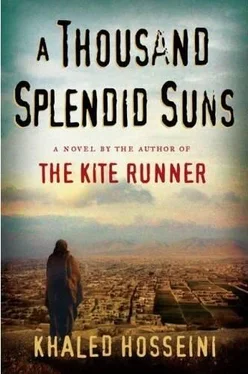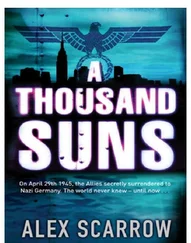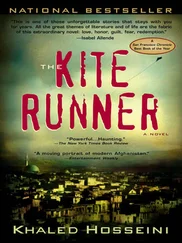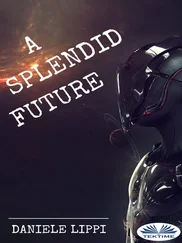From the walls of the room, Ahmad and Noor smiled down. Laila watched Mammy's eyes bouncing now, guiltily, from one photo to the other. As if looking for their consent. Their blessing. As if asking for forgiveness.
"There's nothing left for us here," Babi said. "Our sons are gone, but we still have Laila. We still have each other, Fariba. We can make a new life."
Babi reached across the bed. When he leaned to take her hands, Mammy let him. On her face, a look of concession. Of resignation. They held each other's hands, lightly, and then they were swaying quietly in an embrace. Mammy buried her face in his neck. She grabbed a handful of his shirt.
For hours that night, the excitement robbed Laila of sleep. She lay in bed and watched the horizon light up in garish shades of orange and yellow. At some point, though, despite the exhilaration inside and the crack of artillery fire outside, she fell asleep.
And dreamed.
They are on a ribbon of beach, sitting on a quilt. It's a chilly, overcast day, but it's warm next to Tariq under the blanket draped over their shoulders. She can see cars parked behind a low fence of chipped white paint beneath a row of windswept palm trees. The wind makes her eyes water and buries their shoes in sand, hurls knots of dead grass from the curved ridges of one dune to another. They're watching sailboats bob in the distance. Around them, seagulls squawk and shiver in the wind. The wind whips up another spray of sand off the shallow, windward slopes. There is a noise then like a chant, and she tells him something Babi had taught her years before about singing sand.
He rubs at her eyebrow, wipes grains of sand from it. She catches a flicker of the band on his finger. It's identical to hers – gold with a sort of maze pattern etched all the way around.
It's true, she tells him. It's the friction, of grain against grain. Listen. He does. He frowns. They wait. They hear it again. A groaning sound, when the wind is soft, when it blows hard, a mewling, high-pitched chorus.
BABI SAID THEY should take only what was absolutely necessary. They would sell the rest.
"That should hold us in Peshawar until I find work."
For the next two days, they gathered items to be sold. They put them in big piles.
In her room, Laila set aside old blouses, old shoes, books, toys. Looking under her bed, she found a tiny yellow glass cow Hasina had passed to her during recess in fifth grade. A miniature-soccer-ball key chain, a gift from Giti. A little wooden zebra on wheels. A ceramic astronaut she and Tariq had found one day in a gutter. She'd been six and he eight. They'd had a minor row, Laila remembered, over which one of them had found it.
Mammy too gathered her things. There was a reluctance in her movements, and her eyes had a lethargic, faraway look in them. She did away with her good plates, her napkins, all her jewelry – save for her wedding band – and most of her old clothes.
"You're not selling this, are you?" Laila said, lifting Mammy's wedding dress. It cascaded open onto her lap. She touched the lace and ribbon along the neckline, the hand-sewn seed pearls on the sleeves.
Mammy shrugged and took it from her. She tossed it brusquely on a pile of clothes. Like ripping off a Band-Aid in one stroke, Laila thought.
It was Babi who had the most painful task.
Laila found him standing in his study, a rueful expression on his face as he surveyed his shelves. He was wearing a secondhand T-shirt with a picture of San Francisco 's red bridge on it. Thick fog rose from the whitecapped waters and engulfed the bridge's towers.
"You know the old bit," he said. "You're on a deserted island. You can have five books. Which do you choose? I never thought I'd actually have to."
"We'll have to start you a new collection, Babi."
"Mm." He smiled sadly. "I can't believe I'm leaving Kabul. I went to school here, got my first job here, became a father in this town. It's strange to think that I'll be sleeping beneath another city's skies soon."
"It's strange for me too."
"All day, this poem about Kabul has been bouncing around in my head. Saib-e-Tabrizi wrote it back in the seventeenth century, I think. I used to know the whole poem, but all I can remember now is two lines:
"One could not count the moons that shimmer on her roofs,
Or the thousand splendid suns that hide behind her walls."
Laila looked up, saw he was weeping. She put an arm around his waist. "Oh, Babi. We'll come back. When this war is over. We'll come back to Kabul, inshallah. You'll see."
ON THE THIRD MORNING, Laila began moving the piles of things to the yard and depositing them by the front door. They would fetch a taxi then and take it all to a pawnshop.
Laila kept shuffling between the house and the yard, back and forth, carrying stacks of clothes and dishes and box after box of Babi's books. She should have been exhausted by noon, when the mound of belongings by the front door had grown waist high. But, with each trip, she knew that she was that much closer to seeing Tariq again, and, with each trip, her legs became more sprightly, her arms more tireless.
"We're going to need a big taxi."
Laila looked up. It was Mammy calling down from her bedroom upstairs. She was leaning out the window, resting her elbows on the sill. The sun, bright and warm, caught in her graying hair, shone on her drawn, thin face. Mammy was wearing the same cobalt blue dress she had worn the day of the lunch party four months earlier, a youthful dress meant for a young woman, but, for a moment, Mammy looked to Laila like an old woman. An old woman with stringy arms and sunken temples and slow eyes rimmed by darkened circles of weariness, an altogether different creature from the plump, round-faced woman beaming radiantly from those grainy wedding photos.
"Two big taxis," Laila said.
She could see Babi too, in the living room stacking boxes of books atop each other.
"Come up when you're done with those," Mammy said. "We'll sit down for lunch. Boiled eggs and leftover beans."
"My favorite," Laila said.
She thought suddenly of her dream. She and Tariq on a quilt. The ocean. The wind. The dunes.
What had it sounded like, she wondered now, the singing sands?
Laila stopped. She saw a gray lizard crawl out of a crack in the ground. Its head shot side to side. It blinked. Darted under a rock.
Laila pictured the beach again. Except now the singing was all around. And growing. Louder and louder by the moment, higher and higher. It flooded her ears. Drowned everything else out. The gulls were feathered mimes now, opening and closing their beaks noiselessly, and the waves were crashing with foam and spray but no roar. The sands sang on. Screaming now. A sound like… a tinkling?
Not a tinkling. No. A whistling.
Laila dropped the books at her feet. She looked up to the sky. Shielded her eyes with one hand.
Then a giant roar.
Behind her, a flash of white.
The ground lurched beneath her feet.
Something hot and powerful slammed into her from behind. It knocked her out of her sandals. Lifted her up. And now she was flying, twisting and rotating in the air, seeing sky, then earth, then sky, then earth. A big burning chunk of wood whipped by. So did a thousand shards of glass, and it seemed to Laila that she could see each individual one flying all around her, flipping slowly end over end, the sunlight catching in each. Tiny, beautiful rainbows.
Then Laila struck the wall. Crashed to the ground. On her face and arms, a shower of dirt and pebbles and glass. The last thing she was aware of was seeing something thud to the ground nearby. A bloody chunk of something. On it, the tip of a red bridge poking through thick fog.
SHAPES MOVING ABOUT. A fluorescent light shines from the ceiling above. A woman's face appears, hovers over hers.
Читать дальше












